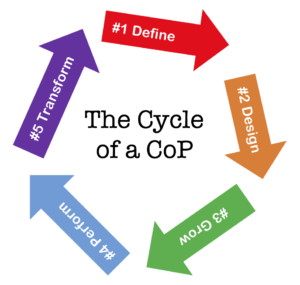Whether you already have an active CoP or you are just starting out, the tools provided here are designed to help you reflect on your CoP vision, goals and strategies.
The Cycle of a CoP
The phases of CoPs are more cyclical than linear, so it is helpful to consider all of the phases whether your group is more novice or veteran. For example, even though “define” is phase #1, it will be beneficial for your CoP to continue to check-in with its definition. If just starting out, it might be helpful to consider the “transform” phase to ensure your CoP is adaptive to changes in funding or goals.

The Phases are Flexible
The phases are meant to be flexible. Phases can be skipped or repeated based on your CoP needs. If you don’t know what you need, then it may help to review all of the phases.
Phase 1: Define your CoP
Whether just starting a CoP or reenergizing an existing CoP, it helps to start with a definition. The definition of your CoP will steer every major decision you make for and regarding your community. In some ways it is like a vision or mission statement.
Phase 2: Design your CoP
Once you have a clear sense of identity, it’s time for your CoP to get busy. It is important that members of your CoP engage with one another in some meaningful way to swap stories, resources, and expertise. Your CoP design will determine member commitment and overall culture of your community.
Phase 3: Grow your CoP
By this phase you already have a general sense of who your CoP members are, the overall vision and purpose of your CoP and you have designed some activities and modes of communication. Now that there is a general sense of rhythm, it’s time to consider expanding!
Phase 4: Let your CoP Perform
Maybe you have just started your CoP – you’ve had a few meetings and you are working on building a website. Or maybe your CoP meets regularly and you see room for greater impact for both members and the public. How can you create and sustain a cycle of participation and contribution?
Phase 5: Transform your CoP
Perhaps you have enjoyed the fruits of your CoP design & growth processes. Maybe you are meeting regularly with substantial involvement. Suddenly, a key stakeholder or resource is removed – how can your CoP adapt to new circumstances? Does your CoP need to change? Or is it time to consider retiring your CoP?